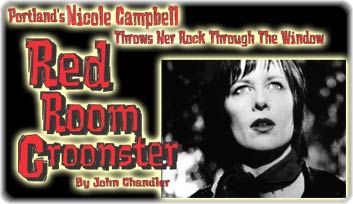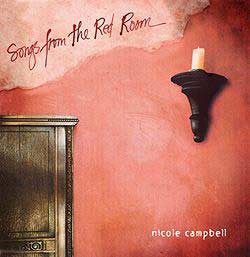|
|
| xmag.com
: June 2001: Red Room Croonster |
|

"Hi, Nicole, this is John Chandler."
"Well, I wanted to line up an interview
with you some time in the next week."
"Exotic magazine? Who are they?"
Now comes the hard part. Normally, when
called upon  to
interview a local artist for Exotic, it's a hard-living
rock and/or roller reasonably familiar with the mag due
to the many rigorous hours spent in Doc's or Mary's admiring
the terpsichorean talent. Nicole Campbell doesn't quite
fit into that category. This isn't to say she's a prude
or anything like that. Indeed, the songs on her two solo
albums, Little Voice (1998) and especially the
new Songs from the Red Room are warm, intimate
and awfully sexy. She calls them "3:00 AM songs." With
her classically trained voice she can sure enough raise
the roof with a banshee howl, but as she demonstrates
on the latest album, Campbell is better served when she
keeps her cool and just lets everything flow. Though her
songs and subject matter are definitely shaded with forbidden
whispers shared between lovers, Campbell is all above
board--a decidedly class act. Her effortless delivery
and enviably emotive voice carry the day. She's also smart,
funny and has a very good band backing her up. For these
reasons, she doesn't have to attract an audience with
a scanty wardrobe or provocative poses (although once
in a while it might be fun, huh?) Which brings us back
to the issue at hand. to
interview a local artist for Exotic, it's a hard-living
rock and/or roller reasonably familiar with the mag due
to the many rigorous hours spent in Doc's or Mary's admiring
the terpsichorean talent. Nicole Campbell doesn't quite
fit into that category. This isn't to say she's a prude
or anything like that. Indeed, the songs on her two solo
albums, Little Voice (1998) and especially the
new Songs from the Red Room are warm, intimate
and awfully sexy. She calls them "3:00 AM songs." With
her classically trained voice she can sure enough raise
the roof with a banshee howl, but as she demonstrates
on the latest album, Campbell is better served when she
keeps her cool and just lets everything flow. Though her
songs and subject matter are definitely shaded with forbidden
whispers shared between lovers, Campbell is all above
board--a decidedly class act. Her effortless delivery
and enviably emotive voice carry the day. She's also smart,
funny and has a very good band backing her up. For these
reasons, she doesn't have to attract an audience with
a scanty wardrobe or provocative poses (although once
in a while it might be fun, huh?) Which brings us back
to the issue at hand.
"You can find Exotic at all the
best strip clubs in town."
"Oh. (silence) Well, all right."
What a trooper. Did I mention that she's
a trooper?
EXOTIC: I left an e-mail on your
mailing list today. It  said.
"Don't forget. Interview at two." said.
"Don't forget. Interview at two."
NICOLE CAMPBELL: It's funny. There
haven't been any entries on my Web site for quite a while.
I finally asked my web guy "What's going on? There hasn't
been anything in the guestbook." It looks like you can
submit something, but it doesn't get posted. Haven't got
the new server figured out yet. I found out last night
that several people have ordered the album and the orders
aren't getting through! As a singer/songwriter, I shouldn't
have to know about web design and server stuff, but as
a record label and a business, I have to know about all
those things.
EXOTIC: If you're really going
to make music your business, you have to look out for
your own interests.
Campbell: Every angle of the
business! Shipping, writing, promo, web design...I update
the Web site myself. Everything from soldering voltage
connectors in a guitar amp to doing the books...there
just isn't a lot of money to throw around to pay people
to do that stuff, so I either do it myself or learn
how.
EXOTIC: You're referring to your
record label, Wrought Iron Records?
Campbell: Yeah. It started out
as just me needing a vehicle for my own stuff, to put
out my own records and look more together than I was.
It's turned into a real business and I happen to have
a real affinity for it. We're on our fourth label release.
I mean, you can either hire out and have someone do
something for you or you can do it yourself. Doing it
yourself is a lot more cost-effective.
EXOTIC: I know some artists just
sit around and hope someone will come along and take
care of all their business needs.
Campbell: Sure, like "Hey, here's
$20,000 that you don't have to pay back or feel bad
about if we lose it all." No, you've got to make it
happen. We've become a real label with all the responsibilities
and hours that implies. I've even had to schedule in
songwriting time! Otherwise you just get sucked into
the business end. There's so many record stores to call.
There's so many promos to send out.
EXOTIC: I did want to address
your songwriting process. Do you actually have to
rope off a block of time to be creative?
"The secret
is nothing more than working your ass off. If a door
closes, go through the window. If the window is shut,
look for a rock."
Campbell: Yes and no. Sometimes
I have to put reminders in my schedule, like, "Did
you remember to eat? Did you remember to take a walk?
You've been sitting at a desk for six hours!" I do
a lot of session vocal work at night or we rehearse
or I review my day job stuff and then, Friday night
at eleven, when people are going to sleep I stay up
'til two or three in the morning when everything's
finally quiet. That's writing time.
EXOTIC: That seems like an
appropriate time to work. You're tired and can tap
into the dream state and all.
Campbell: I usually can't translate
dreams to the waking world. I'll have music dreams
and then when I wake up I won't be able to even hum
the melody I heard in the dream. There seems to be
no connection between the brain, the vocal cords and
the dream thought. I never fully form a lyric without
a guitar in my hand. For me, melody, lyrics and rhythm
with a guitar all go together.
EXOTIC: After your first band
Ivan's Wish broke up, you laid out for a while and
sang backup with 17 Reasons Why and some others. Were
you just not ready for solo work yet?
Campbell: With Ivan's Wish,
we would play really loud. We also used to record
every show off the board. I started listening to some
of the tapes we'd made in the last year together,
and I could tell I was losing my voice. It was getting
smaller and smaller. That's what happens when you
battle the band for volume every night. After we broke
up, I just wanted to get my voice and my confidence
back, so I did these shows with other bands. It was
nice to not be the center of attention. I could just
stand in the back and wear the cute dress
EXOTIC: Be a Pip instead
of Gladys Knight.
Campbell: Yeah. I really
needed to be a Pip for a while.
EXOTIC: You've obviously
got a technically great singing voice and you're
classically trained with a degree in vocal performance.
That seems like a wonderful thing, but it can also
be a mixed blessing, can't it?
EXOTIC: I listened carefully
to both of your studio albums and it sounded like
on Little Voice that you were on edge a little
bit. The first three or four songs seem like you're
trying to stuff in as much of your impressive range
as possible. On Red Room, you sound more
relaxed and for that reason, the mood is stronger
and more real.
Campbell: As a vocalist,
it becomes absolutely crucial that you bring in
a good vocal producer. It's do-or-die. The music
side of Little Voice I thought was great,
but I didn't really get the vocals I wanted. The
woman who co-produced the album with me was very
agreeable and tended to give me the "thumbs up"
a lot as to what I was singing and not much "How
about this?" or "Let's try something else." When
I hired Tony Lash (the producer), I told him, "I'm
counting on you to get an honest vocal performance
out of me." We agreed completely. He said that so
much of what I learned to do classically can turn
into folk affectation. He wanted all of that gone.
He got me to strip my voice down to its lowest common
denominator. What I like about Red Room is
that in every form, musically, lyrically and vocally,
it's much more engaging. It brings the listener
in instead of whaling them over the head with the
vocals.
EXOTIC: What's the response
been to the record so far?
Campbell: Really good. KINK
has added it to their playlist and it's in regular
rotation right now. That's not to say that commercial
radio is the be-all or end-all of success. But the
record has been accepted by both quirky, independent
musicians and the industry, as well. It's straightforward
enough that it seems to be appealing to both sides.
I'm getting really honest, true critical feedback.
Getting positive response from everywhere makes
it great for both the artist and the business owner.
EXOTIC: You've got a product
you can feel good about pitching.
Campbell: A no-apologies
guarantee. I'm really proud of this record.
EXOTIC: I also wanted to
touch on Portland. You mentioned you tried moving
to Los Angeles in the early part of the '90s. Was
it really horrible?
Campbell: It's the armpit
of the industry. I went down there with no backing
and a lot of expectations. Everyone tells you if
you want to make it you have to go to L.A. or New
York. All I had was a demo...I'd only been writing
for a couple of years and it was just too soon for
me. I had a desire to make a career change. I just
wanted to make a move. Before I moved down there,
I had all these promises and potential managers
and potential musicians and naturally when I got
down there it all fell through.
EXOTIC: Let me guess. "My
dad owns a chain of Laundromats and I'm starting
a label!"
Campbell: Yeah, even the
classic, "I want to manage you. What's that? You
won't sleep with me? Forget it." I had a classic
set of experiences with expectations and disappointments.
I ended up spending 99% of the time just surviving.
I hardly wrote any songs. It was the worst possible
artistic experience I could have had.
EXOTIC: Portland may not
be showbiz central, but it's an easy place to live.
Campbell: Oh, yeah. It's
easy to work and live here.
EXOTIC: I've had friends
in bands say "I'm sick of Portland. I'm gonna move
to L.A. and get noticed."
Campbell: Right. Where you're
one of a million instead of one of a thousand.
EXOTIC: Some bands want everything
handed to them and they whine because they're not
playing big shows or signed to a label after six
months.
Campbell: The secret is nothing
more than working your ass off. If a door closes,
go through the window. If the window is shut, look
for a rock.

|
|
|
| ©
2000 X Publishing, Inc. All rights reserved. copyright | trademark | legal notices |
|





